by Heather Plett | Apr 30, 2013 | Leadership, Wisdom, women
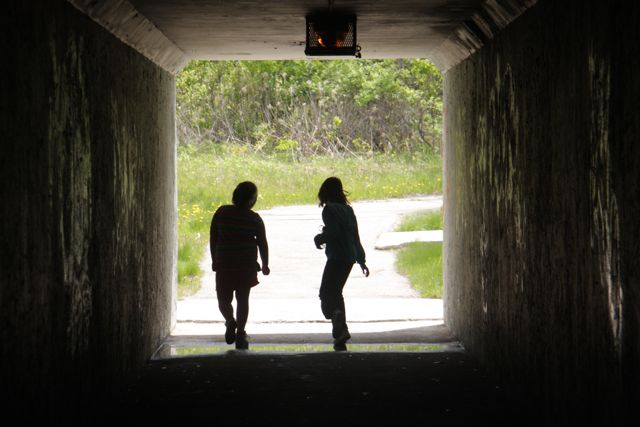 I’m a statistic. I’m one of the women Sheryl Sandburg and others talk about who don’t, in their opinion, help the cause of feminism. I made it all the way to the glass ceiling, peered through the cracks, decided I didn’t like what I saw, and walked out. I’m a “walk out who walked on.”
I’m a statistic. I’m one of the women Sheryl Sandburg and others talk about who don’t, in their opinion, help the cause of feminism. I made it all the way to the glass ceiling, peered through the cracks, decided I didn’t like what I saw, and walked out. I’m a “walk out who walked on.”
There’s a pretty good chance I would have made it through that glass ceiling if I’d “leaned in” long enough. I had all of the credentials and was an ambitious up-and-comer at the time. I took the fast track through the ranks of the public service, had the title “director” added to my name, got the office right next to the corner office, and was making more money than I’d ever dreamed I could.
On top of the career, I had a good feminist husband who carried his share of the household and parenting responsibilities, a couple of beautiful daughters, a house in the suburbs, a minivan, a trailer at the lake, and a boat. You could say I had it all – the feminist’s dream.
And now? I still have the husband and daughters (with an extra one since those days), but I no longer have the trailer at the lake, the boat, the comfortable paycheck or the title of “director” attached to my name. Instead, I have a tiny office in my basement without a window and a fledgling career as a teacher, coach, facilitator and writer.
Some might call me a failed feminist. I let go of the dream that my foremothers fought for. I quit the corporate climb on the wrong side of the glass ceiling. Instead I now spend a good portion of my days creating mandalas with Sharpie markers, hosting story circles, and inviting retreat participants to stitch together quilt squares – not exactly the things a traditional feminist would take pride in.
Why did I walk away from the corporate career and the frequent flyer points in favour of Sharpie markers, quilt squares, and women’s retreats?
There are a few reasons.
- At the height of my career, I had a stillborn son whose presence in my life reminded me that my priorities are not wealth, work, or prestige but rather family, community, and space for spirituality.
- I wanted to find happiness. I knew that the corner office wasn’t my path to happiness.
- I became convinced that it’s time for feminism to grow into something new, and I was pretty sure that I could serve a greater role in helping to birth the new wave of feminism from outside a corporate structure.
It’s that last point that I want to talk about in this article. Instead of a “failed feminist”, I like to think of myself as an “emergent feminist”.
It’s time, I believe, for women to change the world. That won’t happen simply by getting into CEO positions and taking more seats at the boardroom tables. Women will change the world only if we CHANGE LEADERSHIP.
When I was in formal leadership, on my way to the top, I thrived because I learned to think like a man. I listened to the voices of mentors who told me that “feelings have nothing to do with leadership and you should leave them out of the boardroom”, I shut down my intuition in favour of logic, I left my spirituality and much of my creativity at home, I was careful not to be too wild or passionate, and I even started to believe what I was told once that “relationships get in the way of good programming.”
By the time I broke away from formal leadership to start my own business, ten years after being named a director, I was almost completely burnt out from living in a way that was not authentic to me. I returned to the things that made me feel alive – spiritual practices, art-making, wandering in the woods, and relationships – and when I did I realized that THESE THINGS were exactly what had been missing in my leadership practice. More importantly, they weren’t just absent from my own journey, they were missing from leadership in general.
Instead of leaving them at home, I should have clung to them and brought them into my work. Instead of shutting down my feelings and encouraging my staff to do the same, I should have invited them to bring their vulnerability into conversation circles. Instead of creating strategic plans that rarely evoke any imagination, I should have drawn mandalas that wake up the right brain and invite it to the table. Instead of sitting around energy-killing boardroom tables, I should have held staff retreats in the middle of the woods.
For far too long, we’ve accepted a masculine-dominated leadership paradigm in our government offices, our businesses and even our non-profits that is no longer serving us. As Margaret Wheatley and Deborah Frieze say in Walk Out Walk On, we’ve been relying on the leader-as-hero model, when what we really need now is the leader-as-host. In the words of Tina Turner, “we don’t need another hero”. We need people who can lead from a place in the circle, people who can help heal the brokenness in the world, people who help us feel connected again, and people who can remind us of the importance of our relationship with the earth.
“Leadership is about rearranging the chairs, getting the questions right, putting citizens in front of each other and then knowing what’s worth focusing on. The leadership I’m longing for is the leadership that says my number one job is to bring people together, out of exile, out of isolation, and into connection.” – Peter Block
All around us, we see signs of how disconnected we have become – over-consumption of our resources, terrorist attacks, climate change, extreme poverty, etc. These are the stories of a disconnected human race and this disconnection has been fueled by competitive, hierarchical, power-driven leadership that has been allowed to run un-checked.
If the new wave of feminism has a role to play in the world it is not about pushing harder for the corner office, but about bringing us back to a place of connection. Instead of fighting for the top jobs, the power and the prestige, we should be urging our leaders to bring us out of exile and back to community, back to spirituality, back to earth stewardship, and back to ourselves.
Instead of simply fighting to gain entry into the halls of power, we should be working to change the furniture in those halls. It’s time to move the chairs into a circle and open the windows to the world. It’s time to air out the corner office and replace it with conversation spaces. It’s time to replace competitiveness with collaboration, and hierarchy with community.
This is why I decided to walk out and walk on… my role in the world is no longer to fight for power, it’s to help us figure out how to balance power with love. Instead of standing in front of people, I’m sitting beside them and creating space for conversations. Instead of thinking like a man, I’m inviting men to think more like women.
I don’t want the corner office, but that doesn’t mean I don’t want to see a woman there. I will always fight for her right to be there, and when she gets there, I’ll be standing beside her, helping her to take down the walls of her corner office and invite people in. I will urge her to see the world through balanced eyes, honouring both the feminine and the masculine in the world, and creating space for us all to have meaningful conversations that lead the world into the transformation it needs.
I’m now leading from a place in the circle so that I can help other women (and men) learn to do the same. When we’ve gathered into that circle, we can all lean in and listen to each other.
If you’re looking for a new way of defining leadership, join me on a free call on Re-imagining Leadership for our Time on May 1 at 2 pm. Central.
by Heather Plett | Mar 8, 2013 | women
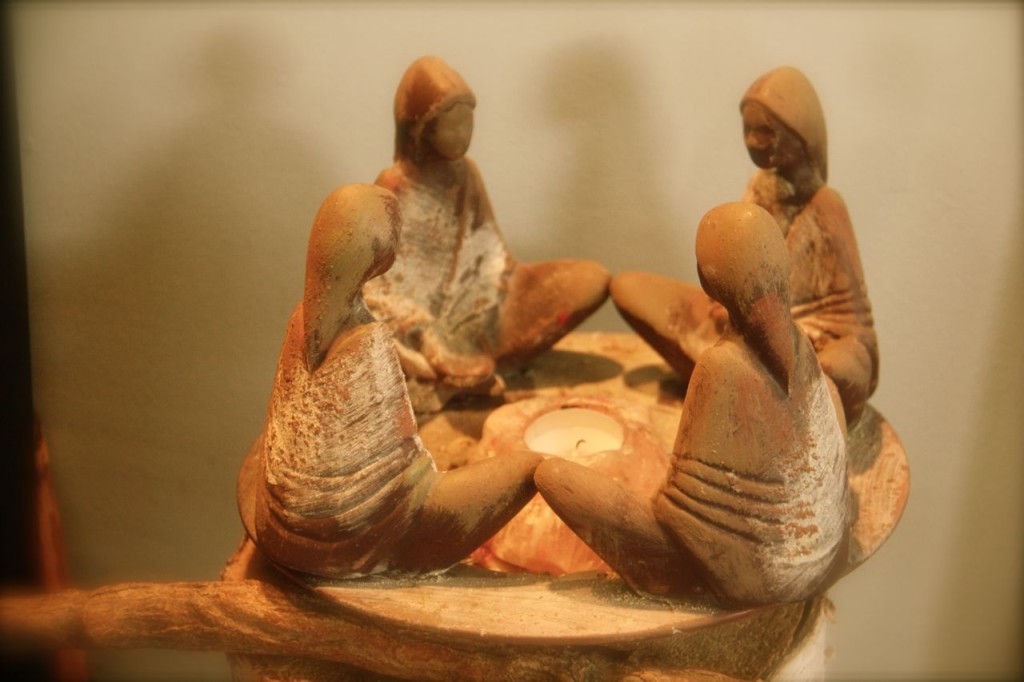
From my Facebook feed…
I wanted to write a “real” blog post for International Women’s Day, but a head cold has made my brain all fuzzy and every time I tried, the words got jumbled up on the way to my keyboard. So instead of a blog post, I raise my glass to the incredible women of courage and resilience in my life…
– Here’s to my beautiful mother, who raised four gifted children and gave us so much love that we knew we wereinfinitely better off than those families who had far more money than we ever had.
– Here’s to my soul sister who gave her heart to a tiny baby, raised that baby as her own, and then watched helplessly as the powers-that-be returned the nearly-two-year-old to her parents.
– Here’s to the courageous young teacher I met in India, who gave up all of her comfort to teach school children on a remote, poverty-stricken, flood-prone island.
– Here’s to the friend, deep in grief after her 21 year old son decided he had nothing left to live for, and the other friend, deep in grief after her 18 year old son died suddenly of an apparent heart attack.
– Here’s to the young woman who left the city for the Ethiopian desert and dared to lead a water diversion project to great success, despite the fact that the locals told her “if it’s run by a woman, it will never work.”
– Here’s to the Ugandan woman, who had the courage to forgive and then befriend the mother of the man who kidnapped her daughter, forced her to serve as a child soldier, and fathered two of her children
– Here’s to my three beautiful daughters, who brave the pitfalls of pre-teen and teen life and dare to let their personalities shine despite the pressures to conform.
– Here’s to the beautiful circle of women who are part of my Lead with your Wild Heart program, who are stepping forward with courage onto the rocky, glorious, and sometimes treacherous paths that leads to their most authentic hearts.
– Here’s to you, my friend. May you have the courage to speak your truth, live with bold love, challenge the oppressors, and let your gifts shine for all the world to see.
by Heather Plett | Feb 6, 2013 | change, circle, Creativity, Leadership, women
I have the great privilege these days of co-hosting a women’s leadership program that meets every second week in a small town an hour and a half from the city where I live. There are so many things about this that I love, including the fact that I have a regular reason to drive out into the country and see the wide open prairies and the wild, alluring woods. With no parents left to visit, I don’t get out to my rural roots often enough to suit me.
On the drive out there yesterday, we had a rare and wonderful sighting of a lynx as it dashed across the road and ran off into the snowy woods. It felt like a moment of blessing.
Yesterday’s session focused on facilitating change. The best change process I know of is Theory U, a process I was first immersed in at ALIA Summer Institute and that I’ve been a dedicated student of since.
I introduced the idea of a Change Lab, where-in we would walk through the U process by casting ourselves in the role of community leaders who recognize the need for change in how the community is organized.
I started out by sharing the story of Baba Yaga’s House in Paris, France, a home created for aging feminists by a circle of women who realized that none of the available models for seniors’ housing fit with their values or expectations of how they wanted to live. (I encourage you to listen to the podcast at the link above.) “Imagine we are these women,” I said. “We are faced with an established community model we know doesn’t work for us, and yet we haven’t found a new model that we’re comfortable with.”
From there I moved on to an explanation of Theory U, a method for co-creating social change. Instead of trying to find a direct route from challenge to solution – the way some of the more linear models do, with brainstorming, strategic planning, etc. – Theory U takes us on a deep dive into the unknown. Instead of trying to direct change, we host what is wanting to be born. Instead of trying to control, we let go and let come. Instead of expecting the future to look like the past with just a few tweaks, we invite a new future to spiral up out of the brokenness of the past.
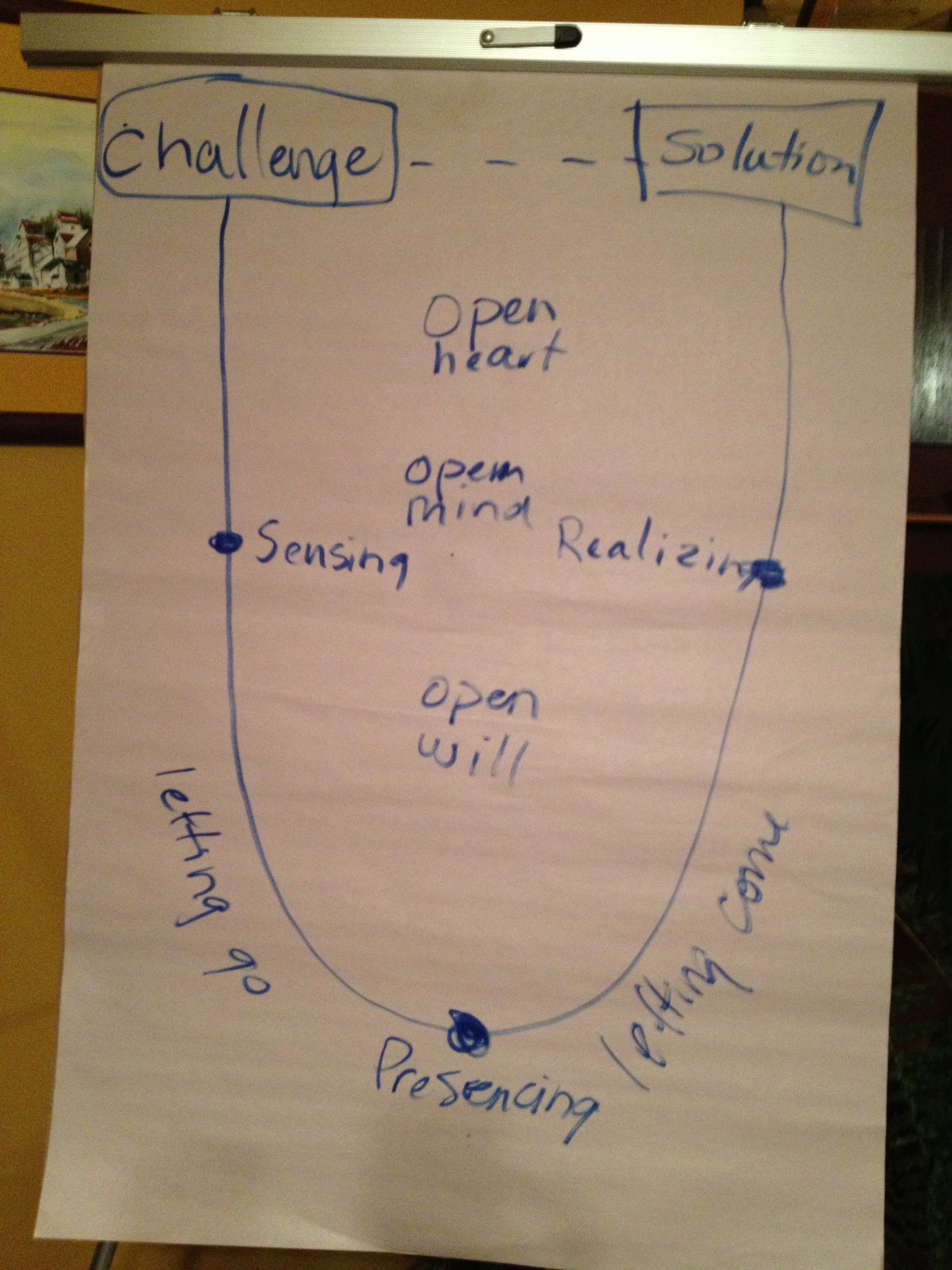 In Theory U there are three main parts – sensing, presencing and realizing. In the sensing phase, we are invited to use all of our senses to witness what is present. We are invited to suspend our judgements, opinions, assumptions and mental models, and to use our eyes and ears and the feeling of our bodies to sense into whatever the context is. We host conversations, we ask good questions, we listen deeply, we watch with full attention, and we notice how our bodies feel.
In Theory U there are three main parts – sensing, presencing and realizing. In the sensing phase, we are invited to use all of our senses to witness what is present. We are invited to suspend our judgements, opinions, assumptions and mental models, and to use our eyes and ears and the feeling of our bodies to sense into whatever the context is. We host conversations, we ask good questions, we listen deeply, we watch with full attention, and we notice how our bodies feel.
In the presencing phase, we are invited into the inner work of grounding ourselves in our bodies and paying attention to what is emerging. We listen into the space and learn from the future as it emerges, letting go of our expertise and experience. Rather than moving directly into problem solving or brainstorming, we take time for retreat and reflection. The best place for presencing is outside in nature where we ground ourselves in the earth and lean into the trees.
The third phase is Realizing. In this phase – on the upward movement out of the U – we “let come” what wants to emerge. We bring insights, sparks of inspiration, and crystals of ideas into prototypes. We move into action quickly and create small projects that can move the vision forward.
When I introduced Theory U to a women’s circle in Ontario last year, someone pointed out that I’d just drawn a woman’s breast. She said it with laughter, but when we started to unpack that, we realize that there was resonant truth to what she witnessed. This process definitely has a feminine aspect to it (as is laid out in this article by Arawana Hayashi) and it relates well to an infant suckling at the source of his/her life. It’s about going back to Source, it’s about seeking nurturing and rebirth, and it’s about the kind of rest and retreat that a mother must seek every few hours when an infant needs to suckle. It’s about being innocent, vulnerable, uneducated, without judgement, and open to a new future, just like that tiny baby. Since that first observation, I’ve brought up the idea every time I introduce it, and it always opens up interesting dialogue.
Once I had introduced the Theory, it was time to move into practice. To start with, I did one of my favourite things to do in workshops – I dumped a pile of garbage on the floor (things I’d gathered from my household recycling bin). “This,” I said, “represents the chaos and brokenness of the systems that no longer work for us. Out of this, something new wants to emerge, but we don’t yet know what it is. It will be up to us to host that new thing into being, without relying on what was or casting judgement on the ‘way it’s supposed to be’.”
In the Sensing phase, I asked them to sit in one-on-one conversations with a few different people in the room. “Ask deep questions, explore what is present, and use your senses to witness what is. Suspend judgement and don’t rely on past or second-hand information.”
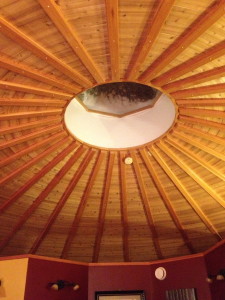 After a few rounds of conversation (too short, but all the time we had), they were invited to move into Presencing. “If it weren’t a cold winter night outside,” I said, “I’d encourage you to move outside for this part. Instead, find a quiet place inside where you can be alone with your thoughts and with whatever wants to emerge.” (As an aside, it felt beautifully appropriate that we were gathered inside a mandala home, a circular home built with great intention around honouring the four directions, giving space at the centre, and blending into the beauty of nature that surrounds it.)
After a few rounds of conversation (too short, but all the time we had), they were invited to move into Presencing. “If it weren’t a cold winter night outside,” I said, “I’d encourage you to move outside for this part. Instead, find a quiet place inside where you can be alone with your thoughts and with whatever wants to emerge.” (As an aside, it felt beautifully appropriate that we were gathered inside a mandala home, a circular home built with great intention around honouring the four directions, giving space at the centre, and blending into the beauty of nature that surrounds it.)
The next phase brought them back to the garbage on the floor, where they began to explore what wanted to emerge. Some felt stuck and really didn’t connect right away with the garbage on the floor. Others were eager to jump in and host the emerging future. Before long, though, everyone had made a valuable contribution to the scale model of the new community that wanted to be born.
We spread our community out on a large piece of cardboard on the table. Some pieces represented a connection with nature, others represented a connection with our neighbours, others represented a connection with opportunities/arts/beauty/etc., and still others represented a deeper connection with self and the sacred.
When we sat discussing the panorama in front of us, we realized that the resounding theme of what was emerging was connection. We were all longing for connection – with each other, with the earth, with the water, with the Sacred, and with ourselves.
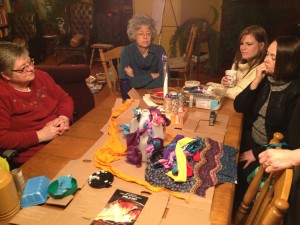 One woman asked “If recycling is the bi-product of a culture of consumption, what can replace consumption as our dominant paradigm that will no longer have a requirement for recycling?” Connection, we agreed. We need deeper connection.
One woman asked “If recycling is the bi-product of a culture of consumption, what can replace consumption as our dominant paradigm that will no longer have a requirement for recycling?” Connection, we agreed. We need deeper connection.
Before we departed for the night, I invited the women to consider (in their private moments, when they were back in their homes) “How might each of us be ambassadors for connection in our communities? How might we begin to invite this future into the circles in which we live?”
The women left with new lights in their eyes that hadn’t been there when they’d entered the room – all because of a pile of garbage and a time of connection.
(Next week’s session flows beautifully out of this… We’ll be talking about making connections in women’s leadership circles, using the new toolkit created by my teachers Christina Baldwin, Ann Linnea, and Margaret Wheatley.)
Note: If you want more inspiration on this, visit Presencing Institute, read Theory U, Presencing, or Walk Out Walk On.
by Heather Plett | Oct 29, 2012 | Compassion, women
Twenty-five years ago, a man climbed through my apartment window and raped me in my bed. When I fought back, he wrapped his angry fingers around my throat, shoved my head between the wall and the bed and tried to choke me to death.
When he finally left my apartment, I ran down the street to my friends’ apartment. While I sat on their couch telling them what had happened, Terence sat on the floor at my feet and cried. He took me to the hospital and stayed there until the doctor had examined me and the police had asked me a hundred questions. Later that day, my brother Dwight came and spent the day with me. Tears appeared in his eyes too.
The next day I went home to the farm and told my parents what had happened. My stoic, pacifist father had to leave the room for awhile to collect his emotions, and when he returned, he admitted that he finally understood the man who’d spent several years of his life hunting down his daughter’s rapist.
Many women showed compassion to me as well, and they are important, but, in retrospect, I believe it was a game-changer for me that men were in my corner along with the women. The fact that all of my family and friends – women AND men – cared about what happened meant that it was a crime against humanity rather than just a crime against women.
From the start, I was able to speak freely of my rape experience, without having to hide behind shame, and that’s largely due to the way that my friends and family supported me. Some people were surprised at how candid I was, expecting me to keep it a secret, but I kept saying “Why wouldn’t I talk about it? A crime was done to me. I did nothing wrong and it doesn’t need to be a secret.”
Sadly, most of the one billion women who experience rape in their lifetime are not able to speak of it. Instead they are taught (by both men and women) that it is something to be ashamed of, that they brought it on themselves, or that it’s cultural taboo to admit that it happened.
We need to talk about rape, and we need men to care about it along with the women. To make real change, rape needs to be seen as a crime against humanity. Anything less than that, and it can be dismissed as a “women’s issue”. If rape is only a women’s issue, than any violence or oppression of women is equally unimportant, and suddenly we have allowed half of the world’s population to be silenced.
Recently, there have been reports of American politicians making unconscionable comments about rape, first about a woman’s body being able to “shut that whole thing down” to prevent pregnancy from a “legitimate rape”, and then a comment that perhaps a pregnancy from a rape was because “God intended it to happen”. According to Nicholas Kristoff’s recent column, these comments only scratch the surface of the real problems related to rape. What’s underneath is a lot of evidence that rape is not taken seriously by the authorities meant to protect American citizens. In many states, the rape kits collected after women are assaulted collect dust on a shelf and are never tested, and in some places, the women who’ve been raped have to pay for the testing to be done.
In a so-called “developed country” it is an abomination that sexual assault is not taken as seriously as other crimes. Violence against half of a country’s population is being overlooked on a regular basis. It’s even worse in other parts of the world where women are often sent away from home after a rape, or forced to marry their rapist.
Violence against women is a serious enough issue on its own, but, sadly, it is only a symptom of a much larger disease that has infected our world and we must take it very, very seriously. It’s a disease I dare to call patriarchy. Patriarchy is an unbalanced system that allows those in power to exploit and violate those who have less power.
If we, as a culture, are willing to overlook rape, then we are saying, in essence, that it is okay to use violence to overpower other people and/or the earth. If we ignore the rape of women, we also ignore the rape of our oilsands, the destruction of our oceans, the plundering of other countries, and the exploitation of the poor.
Power is a destructive force if it is allowed to run rampant without being balanced with love. As Adam Kahane says in his book Power and Love, the two are like the legs we walk on – each one holds the balance for a second and then shifts to the other. It’s the only way we can move forward in a balanced way.
Men (and women) the world over need to start paying more attention to rape because our world depends on it. It cannot remain a shameful issue that women are only allowed to whisper about in the company of other women. Until it has been brought to the forefront of our politics, the world will continue to be out of balance and we will continue to put power ahead of love.
Every woman in the world needs to be surrounded with the kind of compassionate men that I was surrounded with. Only when men and women work together to end rape and to stop the power-imbalance of patriarchy will the world come into balance.
p.s. On February 14, 2013, I’ll be rising with One Billion Rising. Won’t you join me? Women AND men?
by Heather Plett | Aug 28, 2012 | calling, circle, Community, family, journey, prayer, Trust, women
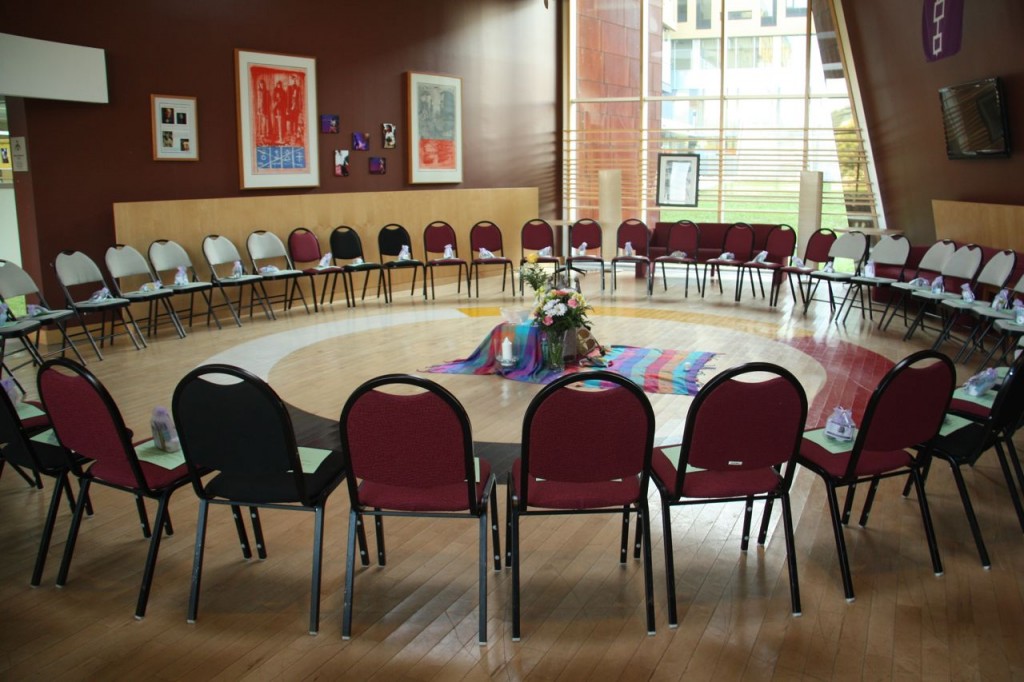 It seems appropriate and metaphorical that my journey to the Gather the Women event I was co-hosting was a long and arduous journey, and yet filled with moments of beauty and grace. The thirty-five hours I’d planned to spend on a train turned into forty-five and a half. I’d looked forward to the many hours of reading, writing, contemplation, and staring out the window (especially after the hard week before), but there’s only so much of that a person can take before the body begins to complain.
It seems appropriate and metaphorical that my journey to the Gather the Women event I was co-hosting was a long and arduous journey, and yet filled with moments of beauty and grace. The thirty-five hours I’d planned to spend on a train turned into forty-five and a half. I’d looked forward to the many hours of reading, writing, contemplation, and staring out the window (especially after the hard week before), but there’s only so much of that a person can take before the body begins to complain.
The moments, though, when I watched a moose run across a pond, or a great blue heron flap its mighty wings as it lifted itself out of the water, or a perfect circle of sunlight streaming out of a dark cloud, made the difficult journey bearable.
When I finally arrived in Peterborough, along with the other three members of the planning committee, I was weary but excited for what the next four days would bring. Forty-five women were gathering from across North America to sit in circle, share stories, and honour their feminine wisdom. I felt incredibly humbled to have the opportunity to host such a gathering. (Side note: I just realized that there was one woman for every hour I spent on the train! That thought makes me smile.)
The night before the gathering was to begin, I got bad news that almost convinced me to return home. The results of my Mom’s CT scan had come back. It was confirmed that the cancer she’d been treated for over the past year was still growing in her abdomen. Grief swept in and encompassed me. I didn’t know how I would make it through the rest of the week and do the job I needed to do.
I shared the news with the planning committee, and they surrounded me with love and community. “Go home if you need to,” they said. “We’ve got your back.”
The next morning, I decided I’d stay. Something told me that being part of this circle of women would help me have the courage to return home to what I needed to face.
It wasn’t easy. The details of gathering – putting together registration packets and gift bags, writing flip charts, and cutting string for my creative workshop – felt so trivial in light of what I was dealing with. At the same time, though, creating a space of comfort and inspiration for the women who were traveling many miles (literally and metaphorically) to be there was not trivial at all.
Before the opening circle began, I stepped into the room where creative women were preparing to sell their art in a small marketplace. Near the entrance was the beautiful art of Maia Heissler. She was in the midst of hanging her beautiful Forest Friends on a small hand-made tree when I stopped to chat with her.
“I’ve created these specially for the gathering,” she said. “They tell the stories of women gathering. This one is of a woman celebrating, surrounded by the women who love her. This one is of a woman who’s been dealt a basket of sorrows. Her community of women are helping her bear the burden.”
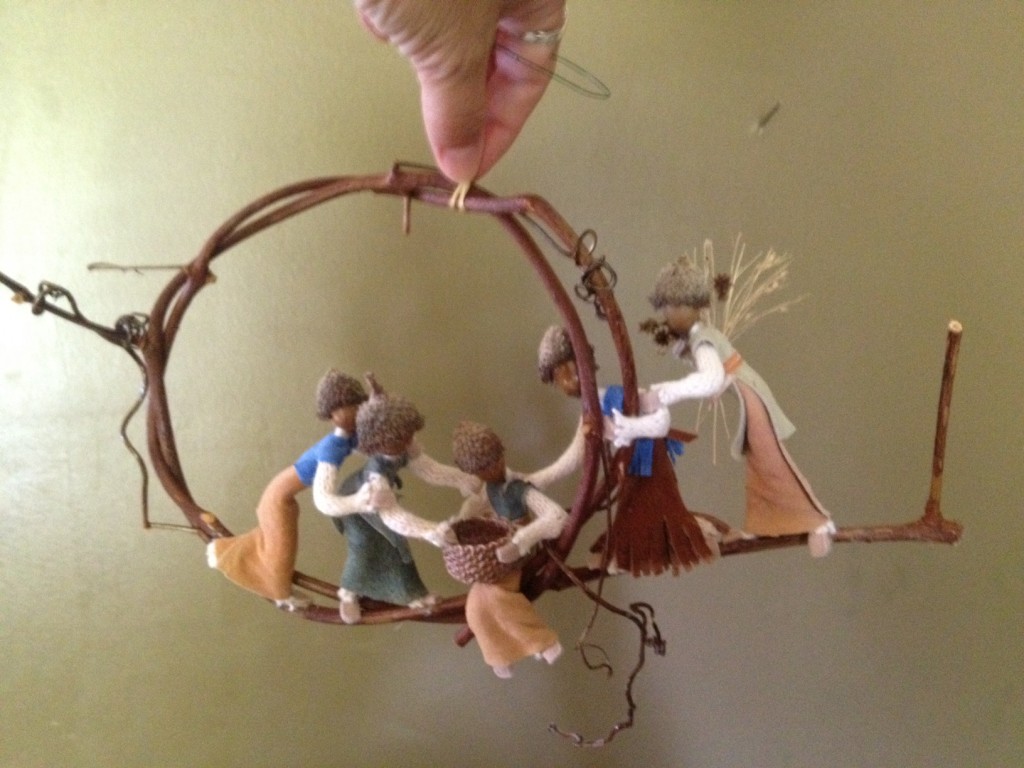
“That one,” I said. “I think I need to go home with that one. I AM that woman with the basket of sorrows.” I didn’t tell her what was in my basket, but I asked her to hold the piece until I’d decided whether I could afford to buy it.
On Thursday evening, there was levity and celebration in the opening celebration. I could hardly bear to be in the room. I spent most of the evening lying on my bed, alone in my room. I emerged only periodically to hear some of the stories that were being shared. Another woman shared how she, too, had taken the train and been subjected to lengthy delays.
Friday morning’s opening circle was beautiful and powerful. One by one we shared stories of how we’d come to be in this circle. Each of us placed a meaningful object in the centre of the circle and then added water we’d brought from our various homes into a collective bowl. When it came my turn to share, I added water that I’d brought from the graveyard where my son Matthew is buried and said that it felt like I was carrying a vial of tears with me. I said nothing about my mom. Something told me to hold that story close for the time being.
In the afternoon, I lead a workshop on storytelling, courage, and community. The women were invited to break into small circles of three to share stories of times in their lives when they’d had courage and times in their future when courage would be required of them. Out of those stories, they chose words and phrases to put onto prayer flags to take home and remind themselves of how the community supports their courage.
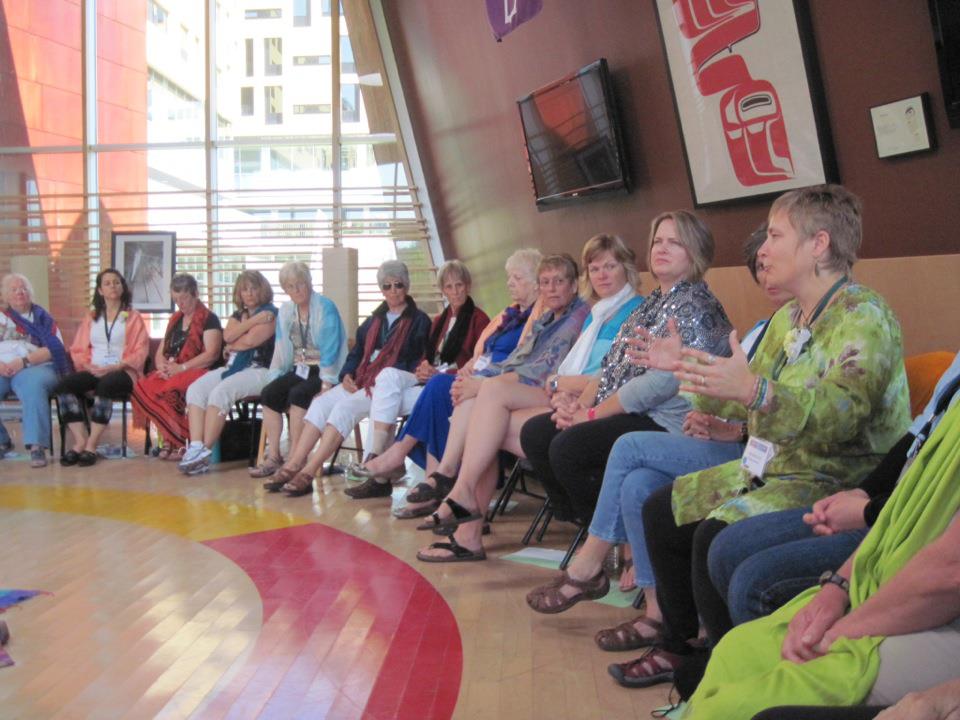
I didn’t participate in the story-sharing. Instead, I walked around with my camera, taking pictures of the beautiful faces as they softened and grew more vulnerable within the safe circles of trust.
Before the weekend ended, I bought the art piece of the woman with the basket of sorrows. Though it felt like more money than I could justify spending on myself, I knew I needed to take it home with me.
As the weekend progressed, I found my spirits lightening despite the heaviness in my chest. I was able to celebrate and dance and sing around the campfire. On Saturday afternoon, together with my delightful and spontaneous friend and mentor Diane, I went swimming in my clothes in the river that runs through the centre of Trent University. We convinced our new young friend Lindsay to join us. It was a lovely moment of lightness and joy.
As we drew nearer to the closing circle on Sunday morning, I contemplated whether or not to share the story of my Mom with the circle. I was a little conflicted. As one of the hosts of the gathering, I was somewhat reluctant to draw too much attention to myself, and yet as a member of the circle, it didn’t feel right to leave the circle without entrusting them with my pain. The beauty of the circle is that we all hold equal positions and one’s pain or joy is as important as another’s.
Just before the closing circle, one of the women with whom I hadn’t spoken much approached me. “You are a gifted woman, and you give so much to the group,” she said. “And yet there’s a sadness in your eyes. I want to honour whatever it is that gives you sadness.” At that moment, I knew I needed to share.
It took quite awhile for the talking piece to make its way to me. As it traveled, I listened deeply to the stories that were shared. So many women were going home with renewed courage and hope and strength after being part of the circle. It was a beautiful thing to behold.
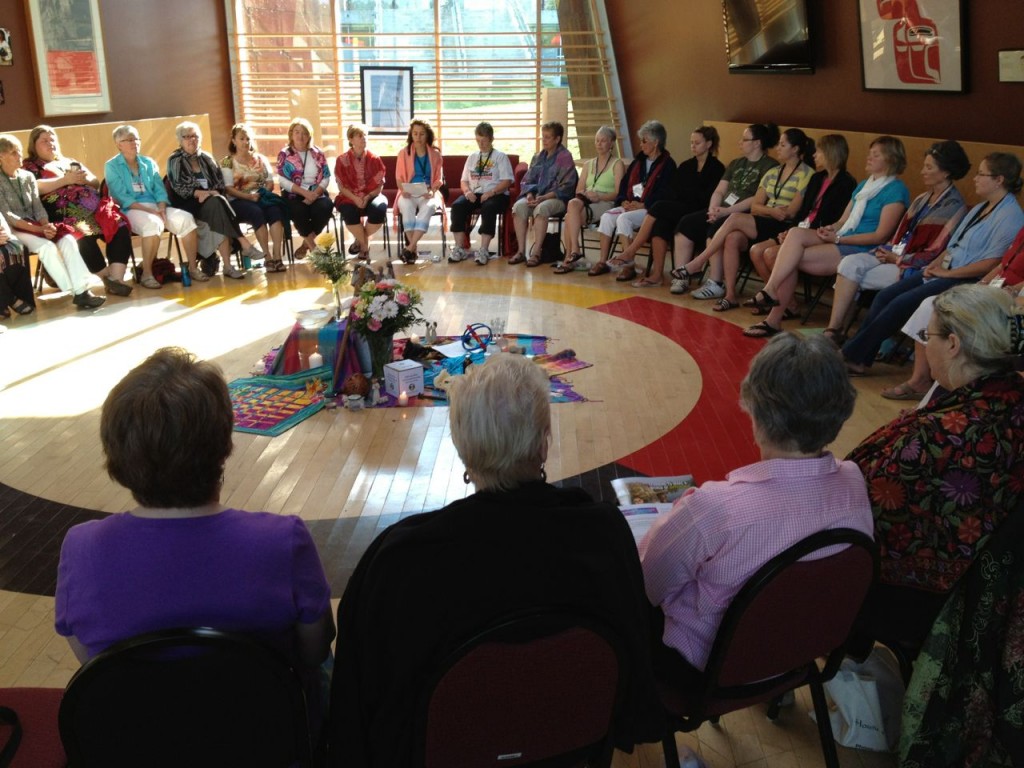
When it came my turn, I began by saying that I felt like I’d just been held in the arms of the Great Mother. “I am conflicted,” I said. “It is always so exciting for me to come to an event like this, because I know that this is my calling – to be in places like this, and to teach more people about storytelling, circles, courage, and community. I want to go home and do big things – teach, write and speak. And yet I have received a new calling this weekend – one that I am much more reluctant to follow.”
And then I shared the news I’d gotten – that my own mother might not be with me much longer. “My calling now,” I said, “is not to do big things, but to do small things – to sit in circle with my mother and be with her as she journeys toward the end of her life here with us.”
I held my water vial up and said “before we meet again, there will be many more tears in this vial.” I looked around the room and saw that nearly every woman in the circle had tears in her eyes. My pain had become their pain.
What an incredibly moving thing it is to know that you don’t cry alone! I am surrounded, in that circle and in the circles I returned to when I came back home, with so much love and community.
Yes, I am a woman who has been dealt a basket of sorrows (as is my mom, my sister, my mom’s sister, my sisters-in-law, and the other women who surround my mom – and of course there are many men in that circle too), but I know that I don’t have to carry it alone, and for that I am immensely grateful.
On Monday, the day after Gather the Women ended, my sister and I went to see the oncologist with my Mom and her husband. There we were told that Mom may be with us for six months or more, but probably less than a year. She has the option of taking more chemo treatments, but that will merely prolong her life somewhat and not stop the growth of the cancer. In the coming months, we need to prepare for her journey into the next life.
I didn’t take the train home on the return trip, and yet I know that there is a long and arduous journey ahead of me in the coming months. I also know that that journey will have intermittent moments of peace, beauty, and grace, just like my train ride did.
This I know – we are surrounded by love and we are held in the arms of the Great Mother/Father. May I continue to trust in that.
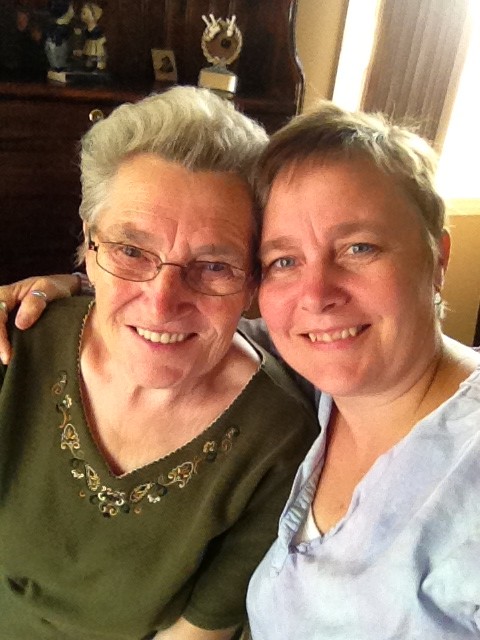
Mom and me
by Heather Plett | Mar 8, 2012 | Wisdom, women

Today is International Women’s Day.
Not long ago, I was on my way to a coordinating committee meeting for a feminist organization I’m part of, and one of my teenage daughters asked “Do we still need feminist organizations? I thought women already had all the rights they need.”
At first I was rather shocked by her response. How could a daughter of mine, who’s been raised in a home where human rights issues are discussed on a regular basis by a mother who doesn’t hesitate to share stories of the women she’s met in other parts of the world who’ve had their genitals mutilated or have been sold into slavery, not understand that there are still many women who are marginalized, ignored, tortured, raped, sold into slavery, etc., etc.?
After the initial shock, though, I realized that part of the reason she asked the question is precisely because she has been raised in an environment where these conversations are a normal part of her day – where women’s equality and ability to lead is never questioned by either her mom or her dad, where her dad respects her choices and takes responsibility for just as much of the child-rearing and household care as her mom, and where she knows she has as many options for her future as her male cousins and friends. Those are good things, and it gives me hope that young women in her generation will enter a work world where equality is assumed and no longer has to be fought for.
According to Gloria Steinem, though, we still have a long way to go. “The Feminist Revolution is the longest revolution in history. I’m not sure we’re halfway through this process. Maybe only a third. That’s why I say to take it in 100-year stretches. Movements have to last at least a century to be fully absorbed and normalized in culture.”
I am part of two organizations that are honouring International Women’s Day in different yet equally relevant ways.
UNPAC, the organization that I sit on the coordinating committee for, is releasing a gender budget report card on the steps of our provincial parliament building today (at 11:30 if you’re in Winnipeg). We’ve done analysis of how our provincial government has or has not indicated their support for women’s issues by committing funding to it and we’re advocating for change in that regard. We still need change. The government barely got a passing grade.
Gather the Women, another organization I’m connected with, has just today launched its website (that I created, by the way) for its annual gathering called Weaving Wisdom, Renewing Spirit, happening in August in Ontario, Canada in August. The women of this organization are supporting the work of women by gathering in circle and honouring feminine wisdom and what gives us unique strength as women – our spirituality, community, connection, stories, and compassion. (I sure would love to have you join us at the gathering!)
Sometimes I feel a little torn by these two approaches – is it better to spend my time and energy advocating for women’s rights, or sitting in circle and dreaming about and working toward a better world where women’s wisdom is valued?
My answer to that question is – it’s best to do both.
We need to continue to challenge the priorities of our government, stand up for those who are being marginalized and brutalized, point out the inequality in the way women are represented in our media, and empower women to make their own choices. We need to continue striving toward a world where women have access to power, and decisions are not made on our behalf. We need to ensure we live in a true democracy where women’s voices are heard as loudly as men’s.
AND we need to sit in circle; support community-building; honour our spirits, intuition, and feminine wisdom; and continue to strive for a world in which women’s wisdom is no longer considered secondary to men’s. We need to believe that collaboration is important as competition, that communities are as important as teams, that circles are as important as hierarchies, that intuition is as important as strategy, and that art and beauty really are transformative.
There are many ways to silence people. You can brutalize them, overpower them, threaten them, or marginalize them. You can imprison them, take away their rights, kill them, or ignore them.
One of the most insidious ways of silencing people, however, is to convince them that their voices are not important, that what they claim as wisdom is just frivolousness, and that their stories have no relevance. That’s what’s been happening for too long to women all over the world.
Yes, it’s horrible that women are being sold into slavery and that genital mutilation is still happening in parts of the world, but it is also horrible that, even in our “progressive” North American culture, the things that women value and the wisdom that we hold is not being valued in a world that desperately needs us.
As I’ve said before, it’s important that women have access to the halls of power (and that’s what the feminist movement has worked hard to ensure), but it’s ALSO important that we start CHANGING those halls of power. The old systems aren’t working as well as they could – they’re too slanted in one direction and they ignore half of the strength we have in humankind.
We need yin and yang – masculine AND feminine, strategy AND intuition, competition AND collaboration, industry AND community, progress AND simplicity, warriors AND lovers, fierceness AND softness, production AND environmental stewardship. We need to be involved with organizations that advocate AND those that sit in circle and honour spirit. We need to fight and we need to love.
“We’ve learned that women can do what men can do, but we haven’t convinced most of the country that men can do what women can do,” says Gloria Steinem. We can serve the world well if we not only stand in our power as women, but also invite men to experience and honour their own feminine wisdom. This is about moving away from dualism into a world where there is middle ground.
In honour of International Women’s Day, I encourage you to consider the rights of women all over the world AND I encourage you to honour your spirit and your wisdom and believe that it can change the world.
I leave you with this poem, written over a year ago when I first started imagining this work I would do with Sophia Leadership.
How to be a Woman
There may come a time, my friend,
when you have lived too many lives that are not your own,
followed too many rules that broke your spirit,
and mastered the art of imitation.
This will be a time when you’ve forgotten your own shape
and you find that you no longer remember just how to be a woman.
Believe this: you can remember again,
you can fit back into the shape that you were meant to be.
It hasn’t truly gone away.
Start by taking a deep breath, and sit quietly while you
listen to the wisdom written on your heart
by your God/Goddess.
Be kind to yourself
caress your skin, your hair, your breasts,
all the body bits that make you woman.
Gently touch the flabby bits, the too-skinny bits,
the old bits, the not-perfect bits
Stop to kiss Mother Earth, Gaia,
bend your knees, run your fingers through her soil
hug her trees, blow kisses into her wind.
Twirl your skirts, kick up your heels
and dance while you listen to the music nobody else hears.
Then, when you are ready, turn your head in the direction
your own journey calls you and don’t look back
even when you hear the cries
of those who feel betrayed by your leaving.
Stand tall, my friend,
you need to be courageous for this remembering
you need to be ready to break things
shift things, disturb the status quo.
You need to be powerful, and wise, and steadfast,
in this re-birth, because it is what is expected of you
by all of those waiting for you to lead them.
Make no mistake – they ARE waiting for you to lead them
because they are afraid, they are hurting,
and they have lost their way.
They need your strength, your courage,
your beauty, your art, to lead them into this new place.
But first,
be gentle, sit quietly,
for you need this time of rest
to prepare you for the journey.
 I’m a statistic. I’m one of the women Sheryl Sandburg and others talk about who don’t, in their opinion, help the cause of feminism. I made it all the way to the glass ceiling, peered through the cracks, decided I didn’t like what I saw, and walked out. I’m a “walk out who walked on.”
I’m a statistic. I’m one of the women Sheryl Sandburg and others talk about who don’t, in their opinion, help the cause of feminism. I made it all the way to the glass ceiling, peered through the cracks, decided I didn’t like what I saw, and walked out. I’m a “walk out who walked on.”









